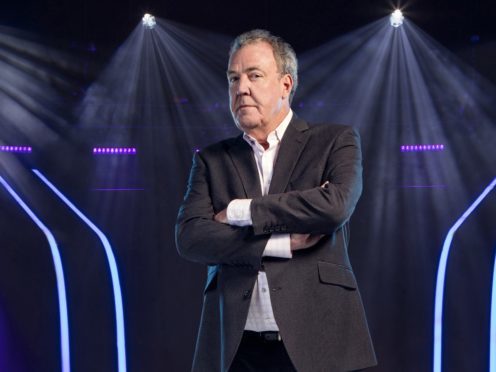Jeremy Clarkson’s debut as the host of Who Wants To Be A Millionaire was watched by more than five million gameshow fans.
The relaunched programme drew in an average of 5.1 million viewers and enjoyed an audience share of 30% for its timeslot, according to overnight ratings.
The programme reached a peak of 5.7 million viewers during its broadcast from 9.15pm until 10.20pm, ITV said.
Playing Who Wants To Be A #Millionaire isn't easy… 😂@MillionaireUK pic.twitter.com/WGsYPLrPU1
— ITV (@ITV) May 5, 2018
BBC One’s Casualty, also on at 9.15pm, had an average of 3.4 million viewers.
However, despite the success of Millionaire – it was more than one million up on viewers compared to the timeslot’s year-to-date average – it was still beaten in the ratings by ITV’s Britain’s Got Talent.
The fourth episode of the TV talent show, hosted by Ant and Dec, was the most-watched of the night across all channels, with an average of seven million and a peak of 8.2 million viewers.
Former Top Gear star Clarkson is in the hot-seat for a special seven-episode run of programmes to mark Millionaire’s 20th anniversary, taking over from original host Chris Tarrant.
His debut was largely hailed a success by viewers, although the contestants hoping to win big money prizes were not so lucky.
The Grand Tour presenter littered his performance with a number of quips, attempts at the Scottish and Yorkshire accents, took aim at his co-star Richard Hammond’s reputation for crashing and referenced the show’s coughing scandal.
However, his three contestants failed to impress, winning a combined total of just £10,000.
That moment when you say you want to 'Ask the host' 😐#Millionaire @MillionaireUK @JeremyClarkson pic.twitter.com/bdh3zmFwpe
— ITV (@ITV) May 5, 2018
Ricky Holmes, from Yorkshire, took home £8,000 before deciding to call it quits while Heather from Woking and Scottish hopeful James reached the £1,000 milestone before both answering questions incorrectly.
There was also a slight mishap during Ricky’s run as his Phone A Friend, Matthew, went straight to voicemail.
Fortunately he picked up at the second time of asking before receiving a barrage of jokes from Clarkson.
Viewers praised his comic approach to the first show, with some commenting that he was an even better choice than his predecessor Tarrant.
At one point, Clarkson told the audience: “No coughing now”, in reference to former contestant Charles Ingram, who in 2001 planted a friend in the audience to cough every time a correct answer was read out.
– Who Wants To Be A Millionaire? returns on Sunday night at 9pm on ITV and will continue nightly throughout the week for a further five episodes.
